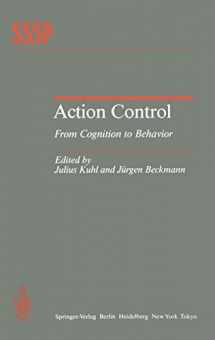
Action Control: From Cognition to Behavior (Springer Series in Social Psychology)
ISBN-13:
9783642697487
ISBN-10:
3642697488
Edition:
Softcover reprint of the original 1st ed. 1985
Author:
Jürgen Beckmann, Julius Kuhl
Publication date:
2012
Publisher:
Springer
Format:
Paperback
302 pages
FREE US shipping
Book details
ISBN-13:
9783642697487
ISBN-10:
3642697488
Edition:
Softcover reprint of the original 1st ed. 1985
Author:
Jürgen Beckmann, Julius Kuhl
Publication date:
2012
Publisher:
Springer
Format:
Paperback
302 pages
Summary
Action Control: From Cognition to Behavior (Springer Series in Social Psychology) (ISBN-13: 9783642697487 and ISBN-10: 3642697488), written by authors
Jürgen Beckmann, Julius Kuhl, was published by Springer in 2012.
With an overall rating of 4.5 stars, it's a notable title among other
books. You can easily purchase or rent Action Control: From Cognition to Behavior (Springer Series in Social Psychology) (Paperback) from BooksRun,
along with many other new and used
books
and textbooks.
And, if you're looking to sell your copy, our current buyback offer is $0.3.
Description
"It is not thought as such that can move anything, but thought which is for the sake of something and is practical." This discerning insight, which dates back more than 2000years to Aristotle, seems to have been ignored by most psycholo gists. For more than 40years theories of human action have assumed that cogni tion and action are merely two sides of the same coin. Approaches as different as S-O-R behaviorism,social learning theory, consistency theories,and expectancy value theories of motivation and decision making have one thing in common: they all assume that "thought (or any other type of cognition) can move any thing," that there is a direct path from cognition to behavior. In recent years, we have become more and more aware of the complexities in volved in the relationship between cognition and behavior. People do not always do what they intend to do. Aside from several nonpsychological factors capable of reducing cognition-behavior consistency, there seems to be a set of complex psychological mechanisms which intervene between action-related cognitions, such as beliefs, expectancies, values, and intentions,and the enactment of the be havior suggested by those cognitions. In our recent research we have focused on volitional mechanismus which presumably enhance cognition-behavior consistency by supporting the main tenance of activated intentions and prevent them from being pushed aside by competing action tendencies.


We would LOVE it if you could help us and other readers by reviewing the book
Book review

Congratulations! We have received your book review.
{user}
{createdAt}
by {truncated_author}


